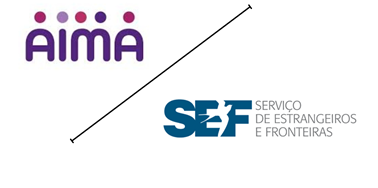Goodbye SEF! Hello AIMA
The extinction of the Immigration and Borders Service (SEF-Serviço de Estrangeiros e Fronteiras) has been the subject of much debate over the last two years, when the end of the service was approved in Parliament. And now it's official. SEF was actually abolished on 29 October and all its police and administrative functions will now be carried out by other institutions. One of them is the recently created Agency for Integration, Migration and Asylum (AIMA), which will be responsible for applications for residence permits from foreign citizens arriving in Portugal (and beyond).
What will replace the SEF?
At the same time as SEF was abolished, the new Agency for Integration, Migration and Asylum (AIMA) took office, which many believe will replace SEF. But this is just one of several institutions that will have competences in the areas that SEF has until now been responsible for, explains Lamares, Capela & Associados* in this article prepared for idealista/news.
Police responsibilities will be redistributed between the Public Security Police (PSP), the National Republican Guard (GNR) and the Judicial Police (PJ).
And the administrative functions related to foreign citizens will now fall under the remit of the Institute of Registry and Notaries (IRN) and the newly created Agency for Integration, Migration and Asylum (AIMA).
In order to coordinate and coordinate all these services, the Border and Immigration Coordination Unit (Unidade de Coordenação de Fronteiras e Estrangeiros-UCFE) has been created, which will be allocated to the Internal Security System (Sistema de Segurança Interna-SSI), experts point out.

Foto de Tima Miroshnichenko no Pexels
Who is responsible for passports and renewing residence permits?
With the restructuring, 75 SEF workers will be transferred to the Institute of Registry and Notaries (Instituto de Registo e Notariado-IRN), with the aim of ensuring face-to-face service and decision-making centre. The IRN inherits two important responsibilities, they say:
Portuguese Electronic Passport: namely the ordinary passport, the special passport, the temporary passport and the passport for foreign citizens
Renewal of residence permits: the registry offices offer appointments. Here it will be possible to renew the Residence Certificate for temporary and permanent foreigners, with the exception of victims of human trafficking and for investment purposes, which are taken care of by AIMA.
Online booking for the renewal of residence permits will be available via the SIGA booking portal and the Siga App application. And there will be more service points, specifically at 34 registry offices and the Citizens' Shops mentioned here.
Where do foreigners who want to apply for new residence permits have to go?
They must go to the Agency for Integration, Migration and Asylum (AIMA). "This agency will be responsible for administrative matters relating to foreign citizens in Portugal, namely residence permits and refugees. It inherited from the High Commission for Migration (ACM) the issues of welcoming and integrating immigrants in Portugal," Lamares, Capela & Associados explains. The information will be available on AIMA's new website, which has no content yet.
The government has formally announced that AIMA will invest heavily in digital infrastructure and hire 190 more employees. And in addition to the 34 current branches, it will open at least 10 new ones within a year. Specifically, these are the main measures announced by the Socialist Executive:
AIMA Portal: to be launched by the end of the year. And it will start with requests for family reunification, dispensing with the current telephone appointment;
Mega operation to recover the 347,000 pending cases: an operation involving local authorities, professional associations and employees of the Local Support Centres for the Integration of Migrants.
Welcome to the new AIMA portal - Learn more

When will the 347,000 backlogged migrant legalisation applications be resolved?
We still don't know for sure. The idea is to prioritise the AIMA legalisation processes. Ana Catarina Mendes, Deputy Minister of Parliamentary Affairs and director of AIMA was quoted in the newspaper Público saying "We're going to launch a mega-operation to clear the backlog of applications for residency from migrants by the end of March".
But according to the known data, there are expected to be 600,000 cases pending for legalisation or renewal of temporary licences by March 2024. This is because there are 347,000 overdue migrant legalisation applications, added to the 199,000 one-year temporary visa renewals given to migrants from the CPLP and a further 53,000 temporary visas given to Ukrainian citizens, according to the same newspaper.
What will the new Borders and Immigration Coordination Unit do?
The new Borders and Immigration Coordination Unit (UCFE) will therefore be coordinating all the services previously provided by SEF that have been distributed to other organisations - some people are already calling it a "Mini-SEF". But in reality, the UCFE will have various powers and responsibilities, as the experts at Lamares, Capela & Associados point out:
Border control: its mission is to ensure uniform compliance with technical standards and procedures when controlling the entry, stay and exit of people at borders;
Centralisation of information: it will gather information on the entry, stay and exit of people on national territory, trafficking in human beings, aiding illegal immigration and other crimes linked to irregular immigration;
Police information management: it will record and update police and criminal information relating to foreigners and issue information on foreigners in an irregular situation;
Security information: it will issue security information and opinions for the granting and renewal of documents, recognise rights, grant nationality to foreigners and issue passports. This information will help assess threats to internal security, public order and safety and in the prevention of illegal immigration and related crimes;
Database management: it will manage police databases and information systems, including the Single Point of Contact (SPC), (Ponto Único de Contacto-PUC), which includes Interpol and Europol, and all the databases that used to belong to SEF.
Copyright: Idealista web site *Article written by Ana Sofia Lamares, lawyer and partner at Lamares, Capela & Associados




